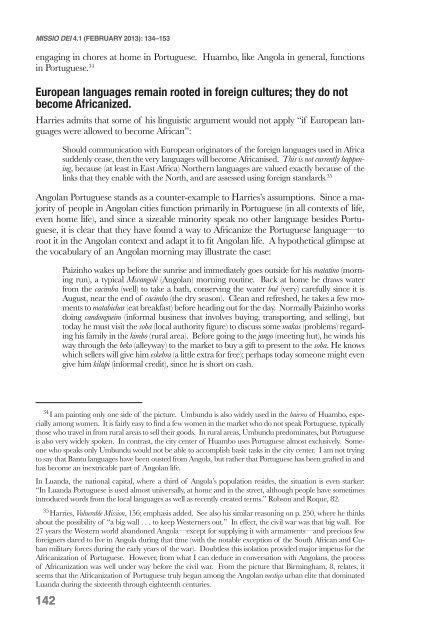VULNERABLE MISSION
VULNERABLE MISSION
VULNERABLE MISSION
You also want an ePaper? Increase the reach of your titles
YUMPU automatically turns print PDFs into web optimized ePapers that Google loves.
MISSIO DEI 4.1 (FEBRUARY 2013): 134–153<br />
engaging in chores at home in Portuguese. Huambo, like Angola in general, functions<br />
in Portuguese. 34<br />
European languages remain rooted in foreign cultures; they do not<br />
become Africanized.<br />
Harries admits that some of his linguistic argument would not apply “if European languages<br />
were allowed to become African”:<br />
142<br />
Should communication with European originators of the foreign languages used in Africa<br />
suddenly cease, then the very languages will become Africanised. This is not currently happening,<br />
because (at least in East Africa) Northern languages are valued exactly because of the<br />
links that they enable with the North, and are assessed using foreign standards. 35<br />
Angolan Portuguese stands as a counter-example to Harries’s assumptions. Since a majority<br />
of people in Angolan cities function primarily in Portuguese (in all contexts of life,<br />
even home life), and since a sizeable minority speak no other language besides Portuguese,<br />
it is clear that they have found a way to Africanize the Portuguese language—to<br />
root it in the Angolan context and adapt it to fit Angolan life. A hypothetical glimpse at<br />
the vocabulary of an Angolan morning may illustrate the case:<br />
Paizinho wakes up before the sunrise and immediately goes outside for his matatino (morning<br />
run), a typical Mwangolé (Angolan) morning routine. Back at home he draws water<br />
from the cacimba (well) to take a bath, conserving the water bué (very) carefully since it is<br />
August, near the end of cacimbo (the dry season). Clean and refreshed, he takes a few moments<br />
to matabichar (eat breakfast) before heading out for the day. Normally Paizinho works<br />
doing candongueiro (informal business that involves buying, transporting, and selling), but<br />
today he must visit the soba (local authority figure) to discuss some makas (problems) regarding<br />
his family in the kimbo (rural area). Before going to the jango (meeting hut), he winds his<br />
way through the beko (alleyway) to the market to buy a gift to present to the soba. He knows<br />
which sellers will give him eskebra (a little extra for free); perhaps today someone might even<br />
give him kilapi (informal credit), since he is short on cash.<br />
34 I am painting only one side of the picture. Umbundu is also widely used in the bairros of Huambo, especially<br />
among women. It is fairly easy to find a few women in the market who do not speak Portuguese, typically<br />
those who travel in from rural areas to sell their goods. In rural areas, Umbundu predominates, but Portuguese<br />
is also very widely spoken. In contrast, the city center of Huambo uses Portuguese almost exclusively. Someone<br />
who speaks only Umbundu would not be able to accomplish basic tasks in the city center. I am not trying<br />
to say that Bantu languages have been ousted from Angola, but rather that Portuguese has been grafted in and<br />
has become an inextricable part of Angolan life.<br />
In Luanda, the national capital, where a third of Angola’s population resides, the situation is even starker:<br />
“In Luanda Portuguese is used almost universally, at home and in the street, although people have sometimes<br />
introduced words from the local languages as well as recently created terms.” Robson and Roque, 82.<br />
35 Harries, Vulnerable Mission, 156; emphasis added. See also his similar reasoning on p. 250, where he thinks<br />
about the possibility of “a big wall . . . to keep Westerners out.” In effect, the civil war was that big wall. For<br />
27 years the Western world abandoned Angola—except for supplying it with armaments—and precious few<br />
foreigners dared to live in Angola during that time (with the notable exception of the South African and Cuban<br />
military forces during the early years of the war). Doubtless this isolation provided major impetus for the<br />
Africanization of Portuguese. However, from what I can deduce in conversation with Angolans, the process<br />
of Africanization was well under way before the civil war. From the picture that Birmingham, 8, relates, it<br />
seems that the Africanization of Portuguese truly began among the Angolan mestiço urban elite that dominated<br />
Luanda during the sixteenth through eighteenth centuries.


